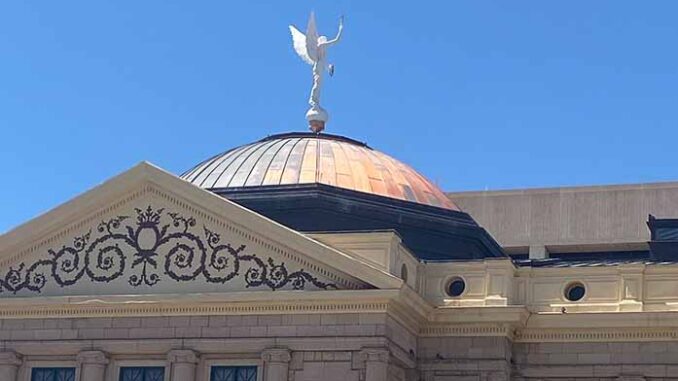
The Arizona State Legislature on Monday overwhelmingly passed a bipartisan transportation tax bill to extend Maricopa County’s soon-to-expire Proposition 400. The bill now goes to Governor Hobbs’ desk where it is expected to be signed immediately. Nearly every Democrat voted for the bill as did a majority of Republicans. The bill, SB 1102, was sponsored by Senator Frank Carroll.
The half-cent sales tax to fund major transportation projects in Maricopa County has been in place since 1985, when voters approved a ballot measure vetted, supported and referred by the Legislature. In November 2004, voters approved an extension of Proposition 400 for 20 years, which ends on December 31, 2025.
Once the Governor signs SB 1102, voters will get to have the final say on whether to extend the tax, as the entire proposal must be approved by Maricopa County voters.
Republican opponents previously supported a version of the bill that provided two ballot questions: one ballot question about a tax for roads one, and another for approval of public transportation funding. Governor Hobbs vetoed that bill, leaving the Legislature to find a conservative compromise that the Governor would likely sign.
“This latest 20-year Prop. 400 extension prioritizes maintenance and expansion of the critical highways and roads relied upon each day throughout Maricopa County for travel to work and school, as well as for tourism and commerce,” said Senate President Warren Petersen. “The proposal also ensures any road projects funded by these dollars will be aimed at decreasing vehicle congestion and travel times, not unattainable environmental goals established by the radical left.”
“This bill reflects the priorities of voters, to reinvest their tax dollars in the transportation modes they use most. We have eliminated regional funding for the expansion of light rail, commuter rails, trolleys, and streetcars. We have ended a foolish loop to the Capitol, hardly an economic center deserving of additional transit and vehicle congestion. We have increased road funding projects from 54% of the tax to 63%. Republicans have ended the shell game, no longer can dollars be shifted unilaterally after taxpayers have approved the measure,” continued Petersen.
“This plan closely mirrors the Republican plan passed a month ago, and I’m proud that we were able to accomplish this together in a bipartisan way. We have secured a good, responsible product for the citizens of Arizona to consider in 2024, giving voters the option to enhance critical infrastructure that our entire state relies upon,” concluded Petersen.
Funding Allocations of SB 1102:
• Freeways & Highways: 40.5% ($820 million to $2 billion transferred from transit to roads)
• Transit: 37%
• Roads & Intersections: 22.5%
• Light rail expansion: 0%
“It’s important to note any Prop. 400 funding used to meet federal air quality requirements can only be spent to pave unpaved roads and purchase street sweepers,” said Carroll, Vice-chairman of the Senate Committee on Transportation & Technology. “Additionally, cities, towns and the state may not restrict the use or sale of a vehicle based on its energy source. Furthermore, mass transit must recoup at least 10% of costs from farebox revenues, starting in 2027, rising to 20% by 2031.”
“The $24 billion plan now has realistic guardrails in place to make certain taxpayer funds are used to fulfill the needs of our taxpayers and not of special interest groups or bureaucrats,” said Senator David Farnsworth, Chairman of the Senate Committee on Transportation & Technology. “Cities with bus lines not being routinely used by our citizens will not continue to receive Prop. 400 funds. Additionally, there will be no expansion of the wildly unpopular light rail within Maricopa County using Prop. 400 monies. Furthermore, any projects for walkers, runners, cyclists or our disabled community must be adjacent to streets or roadways, and not alongside freeways or highways.”
Capitol observers also noted that as part of the negotiated compromise, the Governor is now expected to sign a bill to cut Arizona’s rental tax that Republicans had sought, and that legislative Democrats had steadfastly opposed.
“It is hard to understand why some Republicans are so upset with Republican legislators who voted in favor of SB1102,” said Jose Borrajero of the Arizona People’s Lobbyist. “The legislators tried a more conservative version a few weeks ago, which resulted in a Hobbs veto. Doing so again would have the same result, namely another veto. Considering the current political landscape in Arizona, Republicans can ill afford to lose any more political capital by approving a bill that would be headed for a certain veto.
“If those angry Republicans would spend less time bitching and more time reading the bill, they would discover that it contains some very favorable provisions,” concluded Borrajero. “For example, SB1102 prohibits the use of any transportation tax revenues for three key items, namely (a) funding light rail expansion, (b) influencing the outcome of elections, and (c) reducing lane miles on highways. We should be thanking our legislators for a job well done, which they did under very difficult circumstances.”
